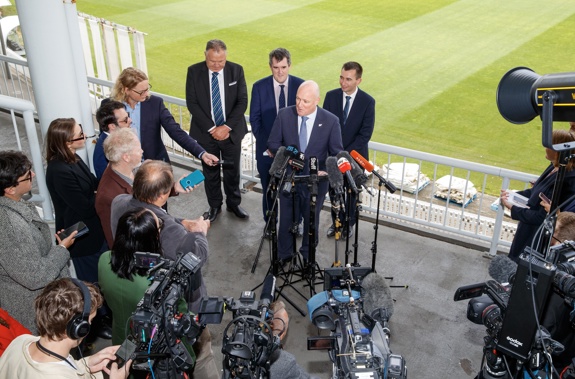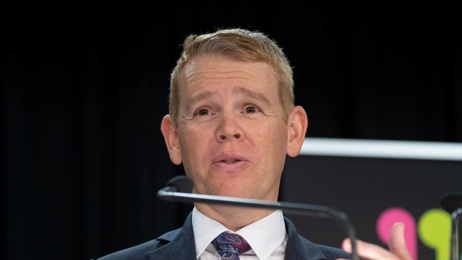
It’s 3:55pm on a Monday afternoon.
The Prime Minister’s just finished leading the most important weekly meeting in the country – chairing Cabinet.
He’s making his way to his weekly post-cabinet press conference, where he’ll face the news-hungry band of two dozen Press Gallery reporters.
Over the course of 45 minutes, he’s quizzed on anything and everything and is held accountable for every word he utters.
After several more hours of meetings, he’s home by around midnight – and is up before 5am to prepare for morning media.
He speaks to RNZ, 1News, Newshub and, of course, ZB’s Mike Hosking; a collective audience of millions all before 8am.
Two hours later, on his way into National’s weekly caucus meeting, he’s confronted by the Press Gallery again – all armed with more questions.

Just a few hours after that, he fronts the Press Gallery yet again on his way into the debating chamber – the third time he's faced them in less than 24 hours.
Moments later, he’s in the House facing questions from the leader of the Opposition.
Chris Luxon’s workload is mammoth. As was Chris Hipkins’, as was Jacinda Ardern’s, as was Bill English’s, as was John Key’s and on it goes.
In the 24 hours from 4pm on Monday, New Zealand’s Prime Minister will do more media than any Kiwi CEO will do in an entire year.
Fronting press is just one part of the Prime Minister’s job and many would argue it’s part of why the Prime Minister’s salary is $470,000 a year (plus perks).
That’s well above New Zealand’s average wage – but then again, it’s not an average job.
Compare what Luxon makes to the country’s top Chief Executives.
Ebos CEO John Cullity earns $8.4 million a year. Fonterra boss Miles Hurrell gets a cool $3.7 million.
Greg Foran, the man who took over from Chris Luxon at Air NZ, got a $3.1 million pay packet last year.
The Herald’s list of CEO pay ends with Genesis Energy’s Tracey Hickman who comes in 54th place earning $567,000 a year.

Meaning Luxon’s $470,000 wouldn’t have even cracked the top 50 – he would have been lucky to even crack the top 100.
Despite the fact an argument many CEOs tend to make when it comes to justifying their exorbitant pay package is media scrutiny, none of them touch the sides of what a Prime Minister does.
Another argument executives make is their level of responsibility within their organisation.
Just under 20,000 people work for Fonterra; almost 12,000 people are employed by Air New Zealand.
The Prime Minister’s public service has an army of 65,000.
What about hours worked? Luxon’s on record that he’s up at 4am many mornings and works past midnight – it was the same with Ardern.
The pressures of decision-making? Ardern shut down the country to keep out Covid. Helen Clark sent troops into a war zone.
On every conceivable level, the job of a Prime Minister is harder, has more pressure and comes with more scrutiny than any CEO in the country.
Despite this, Luxon’s paid 21 times less than Ebos’ John Cullity.
It’s true, it’s not all about the money.
Being a Prime Minister is a patriotic and honorable thing – it's why Prime Ministers receive the Hon (honorable) honorific.

Nevertheless, a Prime Minister’s pay packet should be at least north of $1 million a year to reflect their workload and sacrifice.
And not just the Prime Minister; their Ministers too should be paid much, much more.
Although not at the same level as the PM, Ministers face intense media scrutiny and are in charge of Ministries with tens of thousands of employees.
For their troubles, they’re paid a whisker under $300,000 a year (plus perks).
In fact, in most cases, a Minister will be paid less than the Ministry CE’s that report directly to them.
Police Commissioner Andy Coster makes $670,000 a year, Police Minister Mark Mitchell makes $296,000 (plus perks).
Even a backbench MP, with no leadership or Select Committee chairing responsibilities, who earns $163,000 deserves a fatter paycheck.
Here, it’s less about the workload and more about the type of person we want to be Members of Parliament.
We want people top-of-their game to be coming into Parliament. The best minds in their respective fields. People who know how to lead and get results.
Those people tend to be highly paid and the prospect of leaving a company or organisation paying you many hundreds of thousands of dollars to sit in the back of the debating chamber and speak only when spoken to is not exactly enticing.
Of course, there’s one major barrier to upping MP, Minister and the Prime Minister’s pay – the public.
At the best of times, increasing MP’s pay is contentious.
And when the wider public sector is being forced to sack hundreds of people, the idea of the very politicians telling them to pack their bags getting a pay rise would be politically unthinkable.
But, on the other hand, everyone knows who is attracted when the pay is peanuts.
Take your Radio, Podcasts and Music with you









